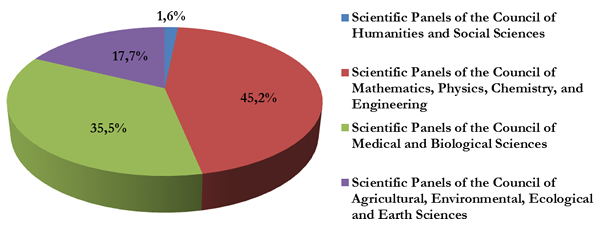Under the call first launched in 2017, in the recent assessment round 25 research groups won funding, i.e. altogether 52 groups received HUF one billion (EUR 3.3 million) in total from the budget available for the call, in two assessment rounds.
József Pálinkás, President of the NRDI Office, observed: “The significance of the international recognition of scientific results has increased worldwide, measured also with the number of outstanding, that is, highly cited scientific publications in different innovation scoreboards and university rankings. Through this new funding scheme, we encourage research groups with a strong impact on the development of their fields to produce further results that pave the way for future research and to share them at scientific fora of the highest visibility. There are numerous internationally acknowledged research schools in Hungary: in the very first year, we are able to support more than fifty research groups in Hungary whose achievements fit in the top 5% of the respective scientific discipline worldwide, in terms of impact (citation). At the same time, encouragement is also needed with regards to international recognition in order to further increase the number of extensively cited publications on results achieved in Hungary by Hungarian researchers.”
József Pálinkás added that the encouragement and acknowledgment of excellent publications and strong citation records through bonus systems is increasingly popular in countries aspiring to the global scientific frontline, mostly in the form of university initiatives. The new funding scheme in Hungary however features new elements that differ from international models:
- Support to be awarded on the basis of publications with outstanding citation is part of the general system of call for proposals, and may be applied against uniform criteria by Hungarian researchers from all scientific disciplines.
- When designing the scheme, experts comprehensively studied potential indicators of scientific impact (citation) and established a set of criteria that foster an increasingly wide visibility of scientific results on the basis of discipline-specific indicators tied to citations.
- As opposed to solutions applied in other countries i.e. incentives included in the researcher remuneration, the Hungarian research funding model allows disbursements on the principal investigator’s salary as well as on research projects resulting excellent publications.
Eligible applicants included researchers and research groups, affiliated with a research institution in Hungary and conducting their research mostly in Hungary, who significantly contributed to genuine research results published after 1 January 2014, accumulating a scientific citation record within the top 5% in their discipline in two years of publication. Among its calls fostering discovery research, the NRDI Office intends to announce this call again next year, allowing applicants whose proposals were rejected due to the lack of funds to submit their proposals again.
The call embraced proposals from all scientific disciplines with no thematic restriction; most of the submitted proposals represented mathematics, physics, chemistry, engineering sciences, as well as medical and biological sciences.
 |
| Proportion of proposals submitted to the NRDI Fund’s KH_17 call by group of disciplines |
To promote research, development and innovation, the NRDI Office has elaborated a coordinated system of calls. Within this portfolio the NRDI Office has established a comprehensive and interconnected set of calls to foster domestic discovery research ranging from the promotion of researchers just about to start their career to the support of independent research groups. In addition to calls open to the wider researcher community dedicated excellence programs enhance the competitiveness of cutting-edge research projects, also with a long-term goal of further increasing the success rate of the funded research groups at the calls announced by the European Research Council (ERC).
The call supporting research groups with results of high international impact is part of the excellence programs announced from the NRDI Fund. Among these, the “Frontline” call aiming to increase the number of research groups producing internationally competitive results and to provide them with funding in a sustainable way, recently has awarded HUF 3 billion (nearly EUR 10 million) in total to 12 research groups. Excellence programs also include schemes promoting access to ERC calls.
Excellence programs were announced with a total budget of HUF 4.5 billion (nearly EUR 15 million) in 2017, while other calls fostering discovery research had a budget of HUF 12 billion (EUR 40 million) in total. Among them, a postdoctoral program supports researchers in their early career stage, followed by another scheme announced for research projects initiated by young researchers seeking their own way to become independent. The call for researcher-initiated projects provides funding for researchers with solid research background. International collaboration to pursue joint discovery research programs is fostered by a dedicated call for international research proposals.
Budapest, November 20, 2017






